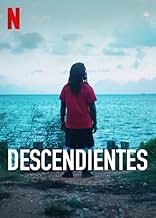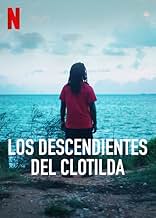IMDb RATING
7.1/10
1.5K
YOUR RATING
Follows descendants of the survivors from the Clotilda, the last ship that carried enslaved Africans to the United States, as they reclaim their story.Follows descendants of the survivors from the Clotilda, the last ship that carried enslaved Africans to the United States, as they reclaim their story.Follows descendants of the survivors from the Clotilda, the last ship that carried enslaved Africans to the United States, as they reclaim their story.
- Awards
- 7 wins & 24 nominations total
- Director
- Writers
- All cast & crew
- Production, box office & more at IMDbPro
Featured reviews
Contrary to widely held belief, just because the US slave trade was outlawed in 1808, that didn't end attempts to continue to import African slaves thereafter. It wasn't until 1860, when the last slave ship, the Clotilde, entered American waters with a hold full of slaves that the practice finally came to an end. And, to conceal this crime, which was punishable by death, the perpetrators scuttled the ship by burning it upon arrival. The location of the wreckage long remained a mystery until a diving team found it in shallow water just north of Mobile, AL in 2018-19. But the discovery was more than just an archaeological curiosity; it was also significant to the descendants of the Clotilde slaves, many of whom settled in a nearby community called Africatown when they achieved freedom after the Civil War in 1865. Those living today now have actual proof of their African lineage, as well as evidence of the crime that was committed against their ancestors. Director Margaret Brown's fourth feature outing explores this story from multiple angles in terms of its historic and personal importance, as well as from all of the fallout that stemmed from their ancestors' experience that has carried through to this day. Given the myriad threads presented in this documentary, the focus admittedly could have been a little tighter in spots, particularly in terms of how the narrative's many dots connect. But, that aside, the film effectively chronicles a little-known story that represents a significant benchmark in African-American history and a potential turning point in terms of how the American public at large views the question of this appalling institution and its after-effects, some of which have lingered but have gone virtually unaddressed and, arguably, even unrecognized all these years. This is a fine film that should be part of every grade school history class and a welcome addition to African-American History Month viewing.
The polluting factories and the highway that destroyed the Downtown area of Africatown are just other facts that help validate what the descendants are saying. Historians use oral histories as part of their research - this is a common practice. A lot of people don't want you to see this documentary. They are afraid of how it will make them look. They are afraid that it will explain someone's situation. This is one of the reasons I watched the documentary. It explains so much about the Bible Belt south. If you care about American history at all, you will find this documentary rewarding. Watch it and decide for yourself.
Slavery was one of the most important, and most disgraceful, parts of US history. Most of the focus on it emphasizes the plantations, the whipping of the enslaved African-Americans, and the Underground Railroad. A lesser known part is the slave trade itself. Outlawed in 1808, it continued in secret. The last ship to bring kidnapped Africans to the United States was the Clotilda, which docked in Mobile, Alabama, before getting sunk to hide its violation of the ban on slave-trading.
Margaret Brown's "Descendant" focuses on this, as well as the descendants of the enslaved people on the Alabama coast. It's a fascinating look at the aftermath of slavery, and how the descendants of the slaveowners are the biggest landholders in the area. Not to mention the chemical refineries dumping all sorts of toxins.
This is not a documentary that you'll forget anytime soon. I recommend it.
Margaret Brown's "Descendant" focuses on this, as well as the descendants of the enslaved people on the Alabama coast. It's a fascinating look at the aftermath of slavery, and how the descendants of the slaveowners are the biggest landholders in the area. Not to mention the chemical refineries dumping all sorts of toxins.
This is not a documentary that you'll forget anytime soon. I recommend it.
This is truly, deeply, sincerely an important piece of US History and an amazing story. The Clotilda and Africatown are remarkable and should be revered. The Clotilda is an extremely rare find that should be a National Monument. But of course - this represents a lot more than just the story of a ship!
I live in Mobile. I know these places! There have been a couple of documentaries now, about the Clotilda - and I have been excited to see them both; however, unfortunately - I don't think anyone has quite hit the mark yet when it comes to telling and presenting this story with the impact it deserves, but this wasn't bad - I enjoyed it - the story and the people are incredible - but I'm still waiting for a Clotilda show that tells it all with the passion and excitement to do this justice.
I live in Mobile. I know these places! There have been a couple of documentaries now, about the Clotilda - and I have been excited to see them both; however, unfortunately - I don't think anyone has quite hit the mark yet when it comes to telling and presenting this story with the impact it deserves, but this wasn't bad - I enjoyed it - the story and the people are incredible - but I'm still waiting for a Clotilda show that tells it all with the passion and excitement to do this justice.
I found this to be a fascinating documentary, that held my attention throughout.
That said, it left me with some unanswered questions, in part because of its format, which focused on interviews with people who lived in Africatown, near where the Clotilda, evidently the last slave ship to arrive in the United States, landed.
I can completely understand why the director and producer would want to give these people a chance to express their views and feelings. They had been ignored for so long.
And I know that documentaries can only be so long before viewers start to turn out and off.
But I would have liked more background about a variety of issues. Do we know anything about the Clotilda's route to the States? Do we know where in Africa it left from? Have any of the descendants taken DNA tests that would help with this?
What was life like for the descendants of the original slaves between the time of Emancipation and today?
And on and on.
None of that is a criticism of the movie, which I enjoyed very much. But because the story it told is so interesting, it left me wanting to know so much more.
That said, it left me with some unanswered questions, in part because of its format, which focused on interviews with people who lived in Africatown, near where the Clotilda, evidently the last slave ship to arrive in the United States, landed.
I can completely understand why the director and producer would want to give these people a chance to express their views and feelings. They had been ignored for so long.
And I know that documentaries can only be so long before viewers start to turn out and off.
But I would have liked more background about a variety of issues. Do we know anything about the Clotilda's route to the States? Do we know where in Africa it left from? Have any of the descendants taken DNA tests that would help with this?
What was life like for the descendants of the original slaves between the time of Emancipation and today?
And on and on.
None of that is a criticism of the movie, which I enjoyed very much. But because the story it told is so interesting, it left me wanting to know so much more.
- How long is Descendant?Powered by Alexa
Details
- Runtime
- 1h 49m(109 min)
- Color
- Sound mix
Contribute to this page
Suggest an edit or add missing content


























